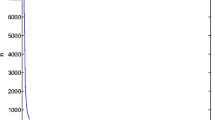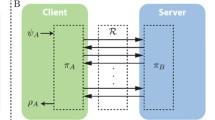Abstract
In this paper, we propose a practical quantum all-or-nothing oblivious transfer protocol. Its security is based on technological limitations on non-demolition measurements and long-term quantum memory, and it has the capabilities of loss-tolerance and error-correction.
Similar content being viewed by others
References
Bennett, C.H., Brassard, G.: Quantum cryptography: public-key distribution and coin tossing. In: Proceedings of the IEEE International Conference on Computers, Systems and Signal Processing, pp. 175–179. Bangalore, India, IEEE Press, New York (1984)
Bennett, C.H.: Quantum cryptography using any two nonorthogonal states. Phys. Rev. Lett. 68, 3121–3124 (1992)
Koashi, M.: Unconditional security of coherent-state quantum key distribution with a strong phase-reference pulse. Phys. Rev. Lett. 93(120501), 1–4 (2004)
Rosenberg, D., Harrington, J.W., Rice, P.R., Hiskett, P.A., Peterson, C.G., Hughes, R.J., Lita, A.E., Nam, S.W., Nordholt, J.E.: Long-distance decoy-state quantum key distribution in optical fiber. Phys. Rev. Lett. 98(010503), 1–4 (2007)
Sun, Y., Wen, Q.Y., Gao, F., Zhu, F.C.: Robust variations of the Bennett–Brassard 1984 protocol against collective noise. Phys. Rev. A 80(032321), 1–7 (2009)
Allati, A.E., Baz, M.E., Hassouni, Y.: Quantum key distribution via tripartite coherent states. Quant. Inf. Proc. 10(5), 589–602 (2011)
Karlsson, A., Koashi, M., Imoto, N.: Quantum entanglement for secret sharing and secret splitting. Phys. Rev. A 59, 162–168 (1999)
Hillery, M., Buz$\breve{{\rm e}}$k, V., Berthiaume, A.: Quantum secret sharing. Phys. Rev. A 59, 1829–1834 (1999)
Qin, S.J., Gao, F., Wen, Q.Y., Zhu, F.C.: Cryptanalysis of the Hillery–Buek–Berthiaume quantum secret-sharing protocol. Phys. Rev. A 76(062324), 1–7 (2007)
Wang, T.Y., Wen, Q.Y., Gao, F., Lin, S., Zhu, F.C.: Cryptanalysis and improvement of multiparty quantum secret sharing schemes. Phys. Lett. A 65–68, 373 (2008)
Nie, Y.Y., Li, Y.H., Liu, J.C., Sang, M.H.: Quantum state sharing of an arbitrary four-qubit GHZ-type state by using a four-qubit cluster state. Quant. Inf. Proc. 10(5), 603–608 (2011)
Bostroem, K., Felbinger, T.: Deterministic secure direct communication using entanglement. Phys. Rev. Lett. 89(187902), 1–4 (2002)
Deng, F.G., Long, G.L., Liu, X.S.: Two-step quantum direct communication protocol using the Einstein–Podolsky–Rosen pair block. Phys. Rev. A 68(042317), 1–6 (2003)
Lin, S., Wen, Q.Y., Gao, F., Zhu, F.C.: Quantum secure direct communication with-type entangled states. Phys. Rev. A 78(064304), 1–4 (2008)
Gao, F., Qin, S.J., Wen, Q.Y., Zhu, F.C.: Cryptanalysis of multiparty controlled quantum secure direct communication using Greenberger–Horne–Zeilinger state. Opt. Commun. 283, 192–195 (2010)
Yang, Y.G., Teng, Y.W., Chai, H.P., Wen, Q.Y.: Revisiting the security of secure direct communication based on ping-pong protocol. Quant. Inf. Proc. 10(3), 317–323 (2011)
Bennett, C.H., Brassard, G., Crépeau, C., Jozsa, R., Peres, A., Wootters, W.K.: Teleporting an unknown quantum state via dual classical and Einstein–Podolsky–Rosen channels. Phys. Rev. Lett. 70, 1895–1899 (1993)
Bouwmeester, D., Pan, J.W., Mattle, K., Eibl, M., Weinfurter, H., Zeilinger, A.: Experimental quantum teleportation. Nature (London) 390, 575–579 (1997)
Chen, X.B., Wen, Q.Y., Zhu, F.C.: Quantum circuits for probabilistic entanglement teleportation via a partially entangled pair. Int. J. Quant. Inform. 5, 717–728 (2007)
Saha, D., Panigrahi, P.K.: N-qubit quantum teleportation, information splitting and superdense coding through the composite GHZ-Bell channel. Quant. Inf. Proc. 11(2), 615–628 (2012)
Jiang, M., Li, H., Zhang, Z.K., Zeng, J.: Faithful teleportation via multi-particle quantum states in a network with many agents. Quant. Inf. Proc. 11(1), 23–40 (2012)
Yao, A.C.: Protocols for secure computation. In: Proceedings of the 23rd Annual IEEE Symposium on Foundations of Computer Science, pp. 160–164. IEEE Computer Society, Washington (1982)
Goldreich, O., Micali, S., Wigderson, A.: How to play any mental game. In: Annual ACM Symposium on Theory of Computing, pp. 218–229. ACM, New York (1987)
Mayers, D.: Unconditional secure quantum bit commitment is impossible. Phys. Rev. Lett. 78, 3414–3417 (1997)
Lo, H.K., Chau, H.F.: Is quantum bit commitment really possible? Phys. Rev. Lett. 78, 3410–3413 (1997)
Anders, J., Browne, D.E.: Computational power of correlations. Phys. Rev. Lett. 102(050502), 1–4 (2009)
Li, Y.B., Wen, Q.Y., Qin, S.: Comment on secure multiparty computation with a dishonest majority via quantum means. Phys. Rev. A 84(016301), 1–3 (2011)
Chen, X.B., Xu, G., Niu, X.X., Wen, Q.Y., Yang, Y.X.: An efficient protocol for the private comparison of equal information based on the triplet entangled state and single-particle measurement. Opt. Commun. 283, 1561–1565 (2010)
Li, Y.B., Wen, Q.Y., Gao, F., Jia, H.Y., Sun, Y.: Information leak in Liu et al.’s quantum private comparison and a new protocol. Eur. Phys. J. D 66, 110–115 (2012)
Tseng, H.Y., Lin, J., Hwang, T.: New quantum private comparison protocol using EPR pairs. Quant. Inf. Proc. 11(2), 373–384 (2012)
Li, Y.B., Wen, Q.Y., Qin, S.J.: Improved secure multiparty computation with a dishonest majority via quantum means. Int. J. Theor. Phys. 52(1), 199–205 (2013)
Li, Y.B., Qin, S.J., Yuan, Z., Huang, W., Sun, Y.: Quantum private comparison against decoherence noise Quant. Inf. Proc. (2012). doi: 10.1007/s11128-012-0517-1
Shimizu, K., Imoto, N.: Communication channels analogous to one out of two oblivious transfers based on quantum uncertainty. Phys. Rev. A 66(052316), 1–15 (2002)
Shimizu, K., Imoto, N.: Communication channels analogous to one out of two oblivious transfers based on quantum uncertainty. II. Closing EPR-type loopholes. Phys. Rev. A 67(034301), 1–4 (2003)
He, G.P., Wang, Z.D.: Oblivious transfer using quantum entanglement. Phys. Rev. A 73(012331), 1–9 (2006)
He, G.P., Wang, Z.D.: Nonequivalence of two flavors of oblivious transfer at the quantum level. Phys. Rev. A 73(044304), 1–4 (2006)
Lo, H.K.: Insecurity of quantum secure computations. Phys. Rev. A 56, 1541–1162 (1997)
Bennett, C.H., Brassard, G., Crépeau, C., Skubiszewska, M.H.: Practical quantum oblivious transfer. In: Proceedings of the Advances in Cryptology-Crypto’90, pp. 351–366. Springer, Berlin (1991)
Danan, A., Vaidman, L.: Quantum practical quantum bit commitment protocol. Inf. Process. 11(3), 769–775 (2012)
Damgard, I., Fehr, S., Salvail, L., Schaffner, C.: Cryptography in the bounded quantum-storage model. In: Proceedings of 46th Annual IEEE Symposium on Foundations of Computer Science, FOCS 2005, pp. 449–458. IEEE (2005)
Zhang, Q., Yin, J., Chen, T.Y., Lu, S., Zhang, J., Li, X.Q., Yang, T., Wang, X.B., Pan, J.W.: Experimental fault-tolerant quantum cryptography in a decoherence-free subspace. Phys. Rev. A 73(020301), 1–4 (2006)
Nguyen, A.T., Frison, J., Huy, K.P., Massar, S.: Experimental quantum tossing of a single coin. New J. Phys. 10(083037), 1–13 (2008)
Kosut, R.L., Lidar, DlA: Quantum error correction via convex optimization. Quant. Inf. Proc. 8(5), 443–459 (2009)
Korcyl, P., Wosiek, J., Stodolsky, L.: Studies in a random noise model of decoherence. Quant. Inf. Proc. 10(5), 671–695 (2011)
Zhang, J., Gangloff, D., Moussa, O., Laflamme, R.: Experimental quantum error correction with high fidelity. Phys. Rev. A 84(034303), 1–4 (2011)
In general use of error-correcting code, Alice encodes a $l$ bits word $W$ to a $m$ bits codeword $C$ with $[m, l]$ error-correcting code, then transmits $C$ to Bob through a noise transmission. Bob obtains $l$ bits $C^{\prime }$ which might have less than $t$ error bits. He first performs the check function $H(x^m)$ on $C^{\prime }$ to check whether the number of error bits exceeds $t$ or not. Then he can decode $l$ bits word $W^{\prime }$ with error-correcting function $D(x^m)$, and it should be that $W^{\prime }=W$. In this protocol, the codeword $C$ is random but not pre-decided by Alice. So the processes are not same to the general error-correcting
Acknowledgments
We are grateful to the anonymous reviewer for helpful comments. This work is supported by NSFC (Grant Nos. 61272057, 61202434, 61170270, 61100203, 61003286, 61121061, and 61103210), NCET (Grant No. NCET-10-0260), Beijing Natural Science Foundation (Grant Nos. 4112040, 4122054), the Fundamental Research Funds for the Central Universities (Grant No. 2012RC0612, 2011YB01), and Key Laboratory Funds of BESTI (Grant No.YQNJ0903).
Author information
Authors and Affiliations
Corresponding author
Rights and permissions
About this article
Cite this article
Li, YB., Wen, QY., Qin, SJ. et al. Practical quantum all-or-nothing oblivious transfer protocol. Quantum Inf Process 13, 131–139 (2014). https://doi.org/10.1007/s11128-013-0550-8
Received:
Accepted:
Published:
Issue Date:
DOI: https://doi.org/10.1007/s11128-013-0550-8




